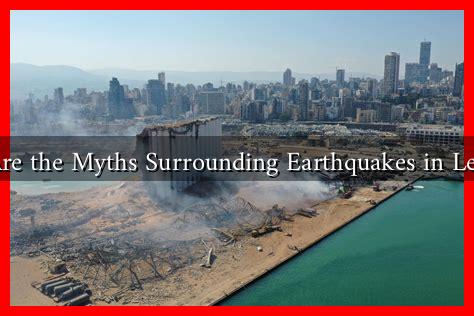-
Table of Contents
- What Are the Myths Surrounding Earthquakes in Lebanon?
- Myth 1: Earthquakes Are Rare in Lebanon
- Myth 2: Earthquakes Can Be Predicted Accurately
- Myth 3: Building Codes Are Sufficient to Prevent Earthquake Damage
- Myth 4: Earthquakes Only Happen in Rural Areas
- Conclusion: Understanding the Reality of Earthquakes in Lebanon
What Are the Myths Surrounding Earthquakes in Lebanon?
Lebanon, a country located in the Eastern Mediterranean, is no stranger to seismic activity. Its geographical position along the boundary of the Arabian and Eurasian tectonic plates makes it susceptible to earthquakes. However, despite the scientific understanding of seismic phenomena, various myths and misconceptions persist among the population. This article aims to debunk some of these myths and provide a clearer understanding of earthquakes in Lebanon.
Myth 1: Earthquakes Are Rare in Lebanon
One of the most common myths is that Lebanon rarely experiences earthquakes. In reality, Lebanon has a history of seismic activity, with significant earthquakes recorded over the centuries.
. For instance:
- The 551 AD earthquake, which devastated the city of Beirut, is one of the earliest recorded seismic events.
- In 1202, another significant earthquake struck the region, causing widespread destruction.
- More recently, the 1999 earthquake in the region of Qana registered a magnitude of 5.2, causing damage to buildings and infrastructure.
According to the Lebanese National Center for Geophysics, Lebanon experiences minor tremors frequently, with larger earthquakes occurring approximately every 100 years. This statistic underscores the importance of preparedness and awareness among the population.
Myth 2: Earthquakes Can Be Predicted Accurately
Another prevalent myth is the belief that earthquakes can be predicted with high accuracy. While scientists have made significant advancements in understanding seismic patterns, predicting the exact time and location of an earthquake remains elusive. The United States Geological Survey (USGS) states that while certain areas may be more prone to seismic activity, the precise prediction of earthquakes is not currently possible.
In Lebanon, this myth can lead to complacency. Many people believe that if they are not warned of an impending earthquake, they are safe. However, the reality is that preparedness is crucial, as earthquakes can strike without warning.
Myth 3: Building Codes Are Sufficient to Prevent Earthquake Damage
Some individuals believe that existing building codes in Lebanon are adequate to withstand earthquakes. However, this is a misconception. While Lebanon has established building regulations, enforcement is often lax, and many structures do not meet the necessary standards for seismic resilience.
- Many older buildings, particularly in historic areas, were constructed without modern engineering practices.
- Recent studies indicate that a significant percentage of buildings in Lebanon are vulnerable to seismic activity.
- The lack of retrofitting for older structures exacerbates the risk of severe damage during an earthquake.
To address these issues, experts recommend strengthening building codes and ensuring rigorous enforcement to enhance the resilience of structures against seismic events.
Myth 4: Earthquakes Only Happen in Rural Areas
Another common misconception is that earthquakes primarily affect rural areas, leaving urban centers relatively safe. This myth can lead to a false sense of security among city dwellers. In reality, urban areas, including Beirut, are at significant risk due to their dense population and infrastructure.
For example, the 1999 Qana earthquake caused considerable damage in urban areas, highlighting the vulnerability of cities to seismic events. Urban planning must take into account the potential for earthquakes, ensuring that emergency response systems and infrastructure are prepared for such disasters.
Conclusion: Understanding the Reality of Earthquakes in Lebanon
In conclusion, the myths surrounding earthquakes in Lebanon can lead to dangerous misconceptions that undermine public safety and preparedness. It is essential to recognize that:
- Earthquakes are not rare in Lebanon; they occur with a frequency that necessitates awareness and preparedness.
- Accurate prediction of earthquakes is not currently possible, making it crucial for individuals and communities to be prepared.
- Building codes must be enforced and updated to ensure the safety of structures against seismic activity.
- Urban areas are not immune to earthquakes and require robust planning and emergency response strategies.
By dispelling these myths and fostering a culture of preparedness, Lebanon can better equip itself to face the challenges posed by earthquakes. For more information on earthquake preparedness, you can visit the Ready.gov Earthquakes page.





